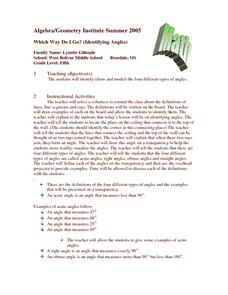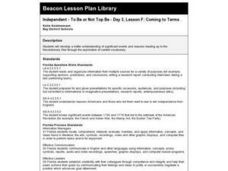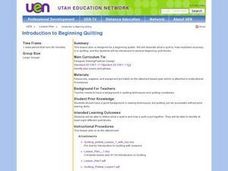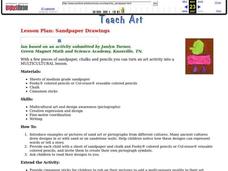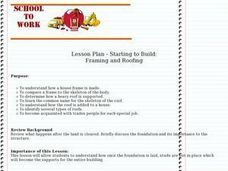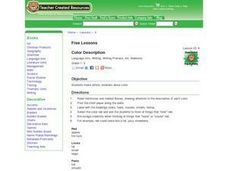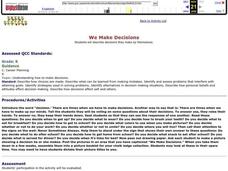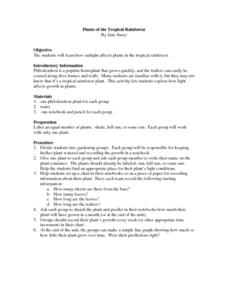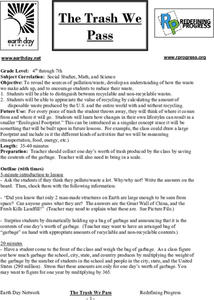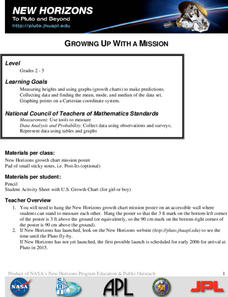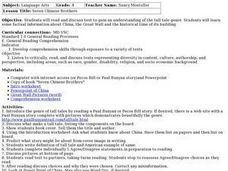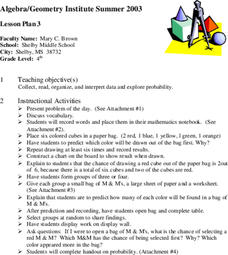Curated OER
Which Way Do I Go? (Identifying Angles)
Fifth graders practice the concepts related to finding and identifying different angles. There are examples included in the lesson that are useful for the teacher to deliver the lesson.
Curated OER
Independent - To Be or Not Top Be - Day 3, Lesson F: Coming to Terms
Fifth graders develop vocabulary through the study of the American Revolution.
Curated OER
Introduction To Beginning Quilting
Students define "what is a quilt". They name eight different basic quilt blocks and ll share their first memories of a quilt. Who made the quilt that you remember? What are your thoughts and feelings about the fabric, design,...
Curated OER
Animals That Fly or Do Not Fly
Students create a chart and classify animals according to if they can or cannot fly. They find and cut out pictures of the animals and glue them in the correct place on the chart.
Curated OER
Litter Recognition
Learners identify litter, and discuss what to do with it. They analyze people's response to litter. Some people may ignore it, while others may pick it up. They observe student behavior as part of an experiment.
Curated OER
Sandpaper Drawings
Students examine sand art pictures from different cultures. They create their own examples of sand art.
Curated OER
Starting to Build: Framing and Roofing
Students examine how a building's foundation is its frame and support system. They compare the frame of a house to the skeleton of the body. They draw roofs and select flooring.
Curated OER
Family Communication Style
Eighth graders explore the different ways that families communicate with each other. After a lecture/demo, 8th graders generate a list of relationships that might benefit from practice in the art of conversation and communication.
Curated OER
People, Props, and Places - Who Do you Want to Be?
Students create a digital self-portrait using the current technology in the schools. They discuss how the portrait is rendered, how the portrait allows us to see into a time period that we are not a part of, and how what she is wearing...
Curated OER
Beach Zonation
Students identify and separate the different zones of the beach by observation. They investigate beach zonation by gathering and comparing sand samples gathered from different areas of the beach.
Curated OER
Welcome to Paul Robeson: Speak of Me As I Am
Eighth graders examine Paul Robeson's contribution to American political and artistic heritage. They also study about McCarthyism and social unrest in America. Finally, they compare the methods used by two civil rights leaders
Curated OER
Decomposition
Students are introduced to the concept of decomposition. They examine decomposition in their school orchard. They write about their findings in a journal.
Curated OER
Sorting
Students explore how to logically sort and store information in order to make it easy to manage and easily retrieved. They explore methods they can use to organize and manage information.
Curated OER
Color Description
Students explore the use of description in literature and color. They read Hailstones and Halibut Bones and discuss the description of each color. Students what each color makes them think of and they create pictures for each color.
Curated OER
Email Around the World
Students send and receive e-mail messages and find the location of each of the messages on a map. Students then write a description and trivia facts about their school to send to others.
Curated OER
Plants of the Tropical Rainforest
Students experiment with the growth of philodendron plants in different amounts of sunlight. They complete a gardening notebook including plant sketches and growth data.
Curated OER
What's In A Name: Art That Honors Achievement
Students examine a quilt by artist Faith Ringgold. They discuss what story is told by the quilt. They create their own collage quilt showing a person for whom a building in Bronx is named.
Curated OER
THe Trash We Pass
Learners identify the sources of pollution and waste in their community. They examine the process of recycling and how to eliminate some of their family waste.
Curated OER
Growing Up With A Mission
Student measure heights and graph them using growth charts for which they find the mean, mode, and median of the data set. They graph points on a Cartesian coordinate system.
Curated OER
Seven Chinese Brothers
Fourth graders identify the characteristics of a tall tale. They read "The Seven Chinese Brothers" and analyze it for these characteristics. Students complete a comprehension worksheet and discuss why "The Seven Chinese Brothers" can be...
Curated OER
Exploring Probability
Fourth graders participate in a lesson that explores probability. They use candy and model cubes to experiment with different outcomes that can be charted if the students can proceed to the objective of the lesson. They discover how...
Curated OER
Excavations
High schoolers engage in a activity that is concerned with the excavation of various types of sites that include mines. The safety standards of working in the mines is covered and practiced with a review of OSHA. Students discuss the...
Curated OER
Tall Tales: Reconstructing A Personal Tell
Sixth graders discover the ways archaeologists examine artifacts and where they are found. After being introduced to new vocabulary, they use artifacts from their own lives and discover what could be told about their life from them. ...


